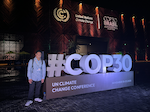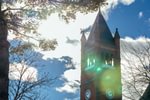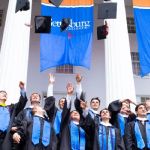

“Very few readers are delusional, but they do exist,” Sharon Stephenson read aloud to a room of writers at last year’s Kenyon Review Writers Workshop. It was the tail end of a public reading. Most writers had already shared their work, and it was the time of night when most start to fidget in their chairs and wonder if they can discreetly check their phones. “In fact, one stands before you now, an outlier on the distribution,” Stephenson continued. “We rare delusional readers believe that perhaps this specific event will be magical.”
She captured the room’s attention—and kept it. (Another writer would later blog about it.)
 Stephenson has also captured the attention of several literary nonfiction magazines over the past several years. Her work has been published in well-known publications like Shenandoah; her work is forthcoming in Fourth Genre. She’s a prolific and thoughtful writer. To those on the Gettysburg campus, however, she’s more widely known as Prof. Sharon Stephenson, the nuclear physicist. It wouldn’t be until Stephenson started teaching her First-Year Seminar, Why Suzy Won’t Take Science and Dan Won’t Play With Dolls, that she would discover she was also a writer.
Stephenson has also captured the attention of several literary nonfiction magazines over the past several years. Her work has been published in well-known publications like Shenandoah; her work is forthcoming in Fourth Genre. She’s a prolific and thoughtful writer. To those on the Gettysburg campus, however, she’s more widely known as Prof. Sharon Stephenson, the nuclear physicist. It wouldn’t be until Stephenson started teaching her First-Year Seminar, Why Suzy Won’t Take Science and Dan Won’t Play With Dolls, that she would discover she was also a writer.
 The First-Year Seminar program at Gettysburg comprises courses on a broad spectrum of topics that are driven by the personal interests of faculty. Stephenson’s class touches on issues of difference and gender and their intersection with science. For example, scientific studies have shown the impact on data of “stereotype threat,” a situation in which people feel like they might fulfill stereotypes about their perceived group. Stephenson asks students to think about how this may affect the scientific process. Is science always really objective? If we’re told our gender is bad at math or good at science, what does that do to our test scores?
The First-Year Seminar program at Gettysburg comprises courses on a broad spectrum of topics that are driven by the personal interests of faculty. Stephenson’s class touches on issues of difference and gender and their intersection with science. For example, scientific studies have shown the impact on data of “stereotype threat,” a situation in which people feel like they might fulfill stereotypes about their perceived group. Stephenson asks students to think about how this may affect the scientific process. Is science always really objective? If we’re told our gender is bad at math or good at science, what does that do to our test scores?
Like other seminars in the menu of options, Stephenson’s course also incorporates a strong writing component, requiring students to write and critique one another’s work.
“Writing in the first year is crucial for our students and is what sets us apart as a liberal arts college—teaching students to communicate well,” said Stephenson.
But when she first started teaching the seminar, Stephenson felt like she wasn’t applying the same steps she uses as a scientist to her own writing process.
“As a physicist, having my peers assess my work is a huge component of my work—that’s what scholars do. But I wasn’t doing that for the First-Year Seminar, and it felt weird, ” she said.
So Stephenson reached out to the editor of The Gettysburg Review, Mark Drew, who recommended that she attend a writing workshop.
“I worked in the nonfiction group, starting to write memoir-ish pieces,” she said. “You had to come in with 20-30 pages of written work ready to be critiqued. I ended up implementing many of the prompts and critique methods I learned there to teaching the First-Year Seminar.”
Soon Stephenson also began writing more of her own work and submitting it for publication.
“I started putting my work out there and embracing rejection, which is the hallmark of writers, I’ve found,” Stephenson joked. “But that’s good for me, too, because it helps me connect more with the struggles students have. I’ve become a novice again. I think it’s helpful for faculty members to remind themselves what it’s like to be intellectually vulnerable.”
Stephenson is teaching the First-Year Seminar with Vice President for College Life Julie Ramsey. In addition to focusing on issues of gender, science, technology and society, race, and sexual orientation, they will focus on this concept of resilience—teaching students that to be intellectually vulnerable is required for personal and professional growth.
“I want them to be fiercely curious and unafraid of failure,” said Stephenson, “and I want to be one of a chorus of diverse faculty and students who make us question the world more. That’s a pretty big goal for one class that meets for four hours, twice a week. But, you know, go big or go home.”
Read more about the First-Year Seminar Program.
Read Stephenson’s creative and scientific work published in The Cupola.


